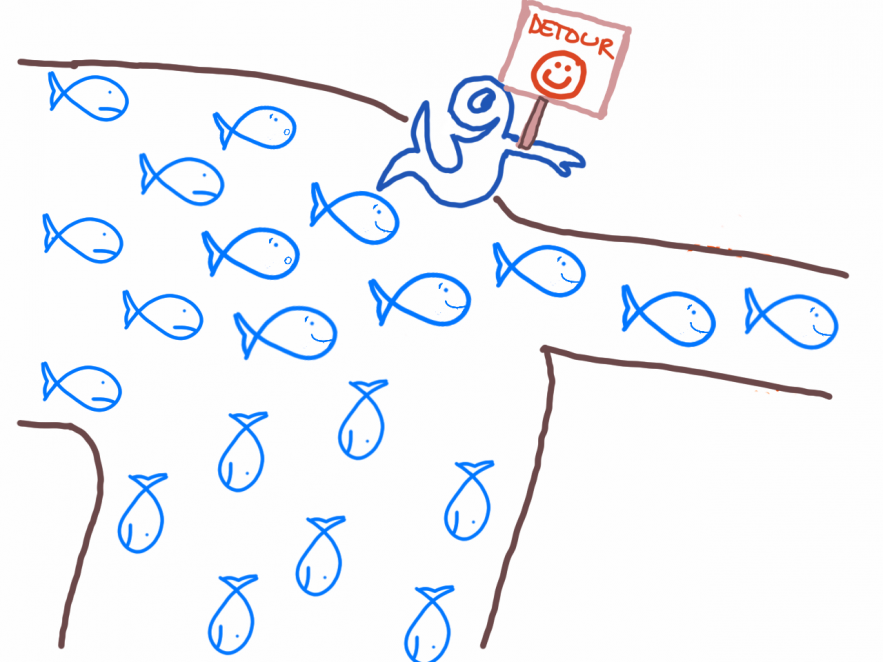PSYCHOLOGY OF US
YOUR RESOURCE LIBRARY
The Science Behind Depression

Most of our emotional brain function happens in the Limbic system where neurotransmitters such as serotonin (which stabilises mood), dopamine (makes us feel pleasure) and GABA (calms anxiety) all play a role in our emotional wellbeing.
Sometimes our complex emotional system falters and we receive either excessive or insufficient amounts of these neurotransmitters and depression symptoms arise as a result (1).
This brain chemical imbalance may be caused by a combination of factors such as genetic propensity and early life stress.
Read more about causes: Clinical Depression, Down but Not Clinically Depressed.
Neuroscientist Antonio Damasio suggests that all emotions serve evolutionary purposes. Similar to how hunger prompts us to eat, emotions are ‘action-requiring neurological programmes’ whose purpose is to motivate us to act in ways that ensure our survival and fulfill our basic needs: rest, safety, bonding, and resources (2). For example, the emotion fear motivates us to assess our situation and protect ourselves from danger. Anger motivates us to acknowledge when others hurt us and to react in ways that deter it from happening again (3).
It may be difficult to imagine how an emotion as disruptive as depression could serve a motivational function. However, neurologist and emotions expert Joseph Ledoux suggests that our ancestors would go into depressive states when they were weak. This served to conserve their energy and prompt other tribe members to take care of them until they could recuperate sufficiently to defend themselves again (5). Although we have evolved to live in safer environments, ‘depression remains a way of defending ourselves against overwhelming thoughts and emotions’. We may go into a depressive state when we feel overwhelmed (3).
Another evolutionary theory suggests that when our ancestors were faced with complex problems, depressive symptoms slowed them down and inhibited them from other distracting activities (like eating or sex) so they could focus on resolving their issues (6). In modern times, studies have found that people in depressed states are more capable of analyzing and solving social dilemmas (7).
Psychiatrist and Scientific American writer Paul Andrews suggests that,
When one considers all the evidence, depression seems less like a disorder where the brain is operating in a haphazard way, or malfunctioning. Instead, depression seems more like … an intricate, highly organized piece of machinery that performs a specific function (8).
FIND OUT MORE: How to Alleviate Depression with Monkey Therapy. Depression, Down but Not Clinically Depressed, Steps You Can Take Now to Alleviate Depression
References and Contributors
- Michael Craig Miller. (2009). What causes depression. Harvard Health Publications. Harvard Medical School.
- Antonio Damasio. (1996). Descartes’ Error.
- Karla McLaren. (2010). The Language of Emotions: What Your Feelings Are Trying to Tell You.
- Robert Plutchik. (1980). Theories of Emotion.
- Joseph Ledoux. (1998). The Emotional Brain: The Mysterious Underpinnings of Emotional Life.
- Paul W. Andrews & J. Anderson Thomson, Jr. (2009). The bright side of being blue: Depression as an adaptation for analyzing complex problems. Psychological Review.
- Gary E. Schwartz & Daniel A. Weinberger. (1980). Patterns of emotional responses to affective situations: Relations among happiness, sadness, anger, fear, depression, and anxiety. Motivation and Emotion.
- Paul W. Andrews & J. Anderson Thomson, Jr. (2010). Depression’s Evolutionary Roots. Scientific American Mind.
How therapy works
Worksheets and useful information
Creative Process
Feeling Stuck
Stress
Depression
Feeling Down
Anxiety
Guilt and shame
Find out more
What I do differently
Monkey Therapy
Transformational Coaching
Online Therapy
Trauma
Your inner critic
The science behind it
Steps you can take now
Publications
More than CBT
More than IFS
Psychedelics
Neurodiversity
Thank you!
Your message has been sent. We'll contact you shortly
© 2023 The Monkey Therapist. All Rights Reserved. Site Designed By Samantha Ósk
PRIVACY POLICY